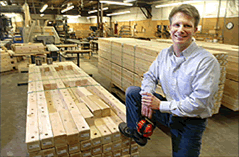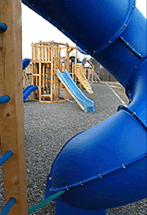Manufacturing Success Story
From Maine to the Suburbs
By Matt Wickenheiser, Portland Press Herald Writer
Copyright © 2006 Blethen Maine Newspapers Inc.
ROCKPORT — CedarWorks Inc. has found a way to sidestep the foreign competition that has crushed many of its domestic colleagues: Take raw Maine cedar, turn it into expensive children’s outdoor play sets and target sales to wealthy suburbanites. Its play sets represent the highest-end backyard toys, starting at $1,500 for a basic, entry-level swing, slide and tower combo. They run to more than $23,000 for a mammoth structure that includes wooden boats, forts, climbing walls and assorted slides, tubes and flags.
Top quality white cedar from Maine, New Brunswick and Quebec goes into the sets, which have been sold in 50 states and 20 countries. CedarWorks doesn’t work through distributors. Every set is sold directly from the company to a consumer.
Only 5 percent of the company’s sales are in Maine; the remaining 95 percent come from affluent areas of the country – mainly the East Coast from Virginia up to Massachusetts and states including Texas, California and Florida.
"It’s exactly the kind of business Maine needs," said Barrett W. Brown, president.

Figure 1. Barrett W. Brown is the president of CedarWorks Inc. in Rockport. The company uses white cedar from Maine, New Brunswick and Quebec to make children’s outdoor play sets. Prices range from $1,500 to more than $20,000.
The company is being recognized next week by the Maine Manufacturing Extension Partnership. The MEP is giving CedarWorks its Manufacturing Excellence Award "in recognition of the company’s efforts toward achieving world-class manufacturing status, implementing best manufacturing practices required to advance in the marketplace and, most importantly, their commitment to improving the lives of their customers and others."
The MEP worked with CedarWorks to improve its operations with a "lean manufacturing" strategy. Lean manufacturing involves careful examination of processes, trying to match the desired end results with the best way of getting there, reducing steps in production and other techniques.
CedarWorks already was an efficient operation, said Jon Kirsch, the MEP project manager who worked with the company. But the company believed it could do better, said Kirsch.
"Everybody from management to the people that work on the shop floor are committed to improving the processes, finding the efficiencies, finding the waste and getting rid of the waste – and they did," said Kirsch. "They didn’t just stop there, that’s the neat thing about this company. With an attitude like that, they’re going to find places to improve."
Many of CedarWorks’ competitors embraced the economy-of-scale approach to play sets, produced units in volume and distributed them through dealers, said Brown. That strategy made the sets more affordable, but it also made them vulnerable when big-box stores like Wal-Mart and Costco began carrying similar products in 2002, he said.
Industry estimates suggest 5,000 play sets were sold by the big boxes in 2002, Brown said, but that total has increased to 75,000 annually.

Figure 2. CedarWorks play sets on display at the company’s Rockport headquarters.
At first, the big-box play sets were made in the United States, but now most are made in China. The competitive pressure has driven several domestic manufacturers out of business, said Brown.
But CedarWorks aims at a different market: affluent families in the ‘burbs.
"That is who our market is, that’s who we cater to," said Brown.
And cater well, apparently. The company has a 98 percent customer satisfaction rating, according to its internal reviews.
Because CedarWorks relies on direct-to-consumer sales, the company’s customer service department keeps detailed records on every customer. Workers know what play set a customer has purchased. When customers want to add to it as their children age, CedarWorks uses those records to help design additions.
A sophisticated Web-based system lets CedarWorks collaborate with customers on design, planning in two dimensions and then viewing the result in 3-D.
The average initial setup is about $5,000, and add-ons can cost at least that much.
The company has been profitable every year except for the first, when Brown’s father bought it in 1988.
Through the 1990s, the company grew sales 10 to 20 percent each year as Americans enjoyed an unprecedented economic boom. Sales have been flattening since 2000, said Brown, though 2004 was a record year for revenue, and 2005 was just a few percentage points lower.
Brown wouldn’t disclose actual sales or profit figures.

Figure 3. Eric Theiss at CedarWorks’ call center in Rockport. Ninety-five percent of the company’s sales are from out of state.
The company is about 40 years old, said Brown, and initially made rustic cedar furniture and fences. In the mid-1970s, a New Jersey couple bought the company. In 1981, they made the company’s first play set, which was unique in that it had all-natural, beefy components.
The company grew, and in 1988, Brown’s father, Duncan Brown, bought it. He knew that he had an "understanding of the affluent suburban family" from his years of living in the Connecticut towns of Torrington and Darien, and that he could grow the product line to that particular market.
In 1995, Barrett Brown’s parents were looking to sell the business. On a family bicycle trip through southern France, the topic came up, and Barrett Brown and his parents agreed that he would join the company in a few years with the goal of eventually running it.
He joined the company in 1997 with the unofficial title of "retirement facilitator" and took over as president in 2000. Today, his father serves as a Massachusetts-based consultant and owns a controlling interest in the business.
Barrett Brown and his sister also have equity stakes in the company.
CedarWorks has fewer than 50 full time, year-round employees, Brown said, and hires temporary workers to handle seasonal spikes. The company has grown its revenue without a corresponding increase in its work force by using cedar supply companies that supply finished components as well raw material.
CedarWorks still makes the core structural components at its Rockport factory, then ships whole play-set packages out of its warehouse facilities here.
Many homeowners put together the sets themselves. The various components, such as decks, roofs, ladders and other pieces, come mostly assembled and just have to be connected to each other. But CedarWorks also has a network of contractors around the country that homeowners can contact for assembly.
That aspect of the business is one that CedarWorks is still trying to improve on, said Barrett Brown. There are other issues for CedarWorks as well, he said.
"Our primary challenge is to ensure that the prospective customer’s perceived value of an investment in a CedarWorks play set is so great that it overcomes their natural tendency to buy something, possibly for less money, from a retailer close to home," said Brown.
"There is no margin of error in our business model," he said. "We have to demonstrate the superior value of an investment in CedarWorks from a customer’s first interaction with us on the phone or via our Web site right through to delivery of the play set and support services thereafter. Otherwise, a prospective customer will follow the path perceived to be more convenient and safer."
CedarWorks Inc.
Route 1, P.O. Box 990, Rockport 04856
Phone: 800-462-3327
Web: www.cedarworks.com
Employees: Fewer than 50 full time
|
